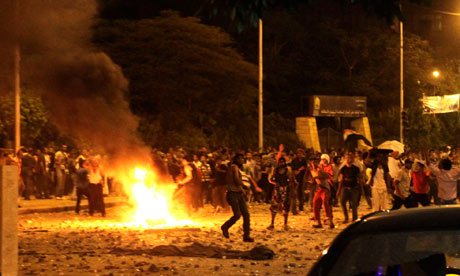More than 140 injured after groups of men with knives attack demonstrators heading for military headquarters
Egyptians loyal to the ruling military council clash with protesters in Abbasiya, Cairo, where the army blocked the road to the defence ministry. Photograph: Asmaa Waguih/Reuters
Thousands of protesters trying to march to the headquarters of Egypt's military rulers have been attacked by groups of men wielding knives and sticks, triggering street clashes that have left more than 100 people injured.
An estimated 10,000 people set out from Tahrir Square in Cairo, but were stopped from reaching the military headquarters in the eastern Abbasiya neighbourhood by army barricades. Security forces also used teargas to disperse protesters.
Saturday's clashes came as tensions mount between the military council that took control of the country after a popular uprising forced President Hosni Mubarak from office and activists who want them to move faster in bringing former regime officials to justice and setting a date for the transition to civilian rule.
The military has appeared impatient with the pressure, accusing activists of treason, warning protesters against "harming national interests" and calling on "honourable" Egyptians to confront actions that disrupt a return to normal life.
The march coincided with the anniversary of the 1952 military coup that toppled the Egyptian monarchy and brought a series of military leaders to office. Bands of men armed with knives and sticks set upon marchers from side roads and in front of the barricades, triggering street battles.
Gunfire was heard, but it was unclear who was shooting. Some firebombs were thrown.
The identity of the attackers could not immediately be determined. Similar groups of men have tried to break up other rallies, and Mubarak's regime often used hired civilians to attack protesters. Some witnesses said they might have been residents or shopkeepers angry at the loss of business as a result of the protests. Others said local residents threw water bottles to the protesters and helped them reach safety.
At one point, a man perched over a female protester, squeezing her against the wall where she was taking cover from the flying rocks. The man cursed her and accused her of being hired to cause chaos, shouting: "Damn your revolution!"
An Associated Press reporter saw a firebomb flying from inside a garden in a side street, landing at a distance from the protesters. The attackers then charged toward the protesters and accused them of throwing the flaming bottle.
"We are extremely angry. These are Egyptians beating us," said Selma Abou el-Dahab, one of the marchers.
A medical official, who did not want to be named, said more than 140 people were taken to hospital with wounds from thrown rocks and falling in the stampede.
The violence broke out following a televised speech commemorating the 1952 coup by Field Marshal Mohammed Hussein Tantawi, head of the ruling military council, who attempted to diffuse tensions by praising young people who led the uprising that toppled Mubarak.
Many protesters have grown distrustful of the military rulers who assumed control of the country on 11 February. A few hundred have been camped out in Tahrir Square since 8 July to pressure the military into bringing those accused of killing nearly 900 protesters during the 18-day uprising to trial. So far, only one low-ranking policeman has been charged in absentia for killing protesters.
Saturday's march was the second consecutive day that protesters tried to reach the headquarters of Egypt's supreme council of the armed forces. On Friday, crowds tried to reach the building to denounce alleged beatings of demonstrators by military forces during another rally in the city of Alexandria.
Tantawi appealed for national unity and called the youth activists "a great product of Egyptian soil".
The military council has promised to hand over power to an elected civilian government within six months. Parliamentary elections are set for October or November, followed by presidential elections, likely next year.
Egyptian protest march descends into violent clashes | World news | guardian.co.uk
